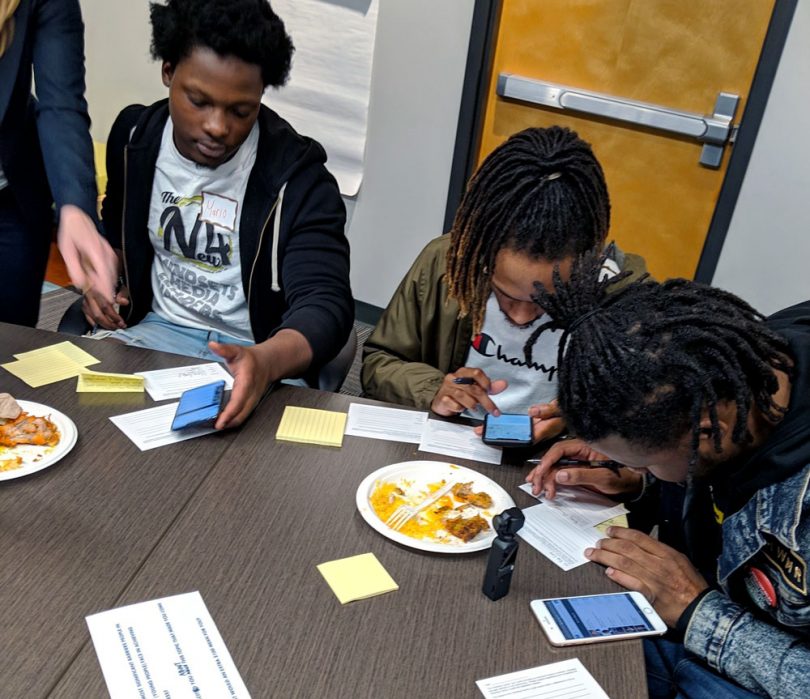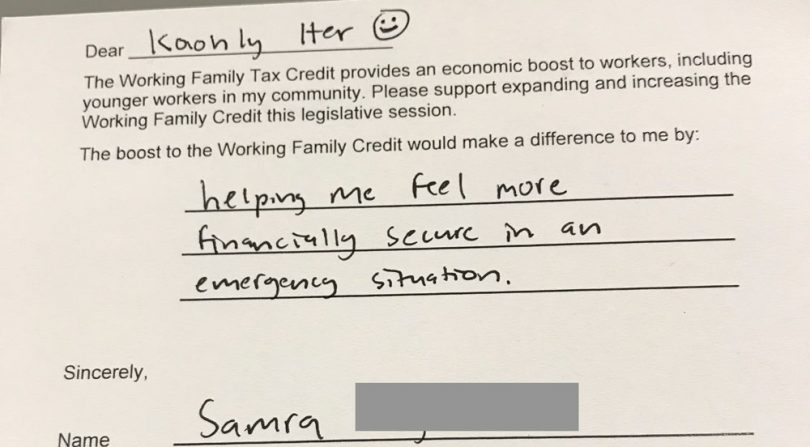Activating the Power of Young Voices For the Working Family Credit
This blog was written by Shannon Holloman about a community conversation Voices for Racial Justice was a part of that took place in April with young workers about economic prosperity and the role of tax credits, specifically Minnesota’s Working Family Credit (WFC) and the push to expand it during this legislative session so that more young people receive more back at tax time.
On the evening of April 16, we, along with our partners Minnesota Budget Project, Children’s Defense Fund of Minnesota, Ujamaa Place, Voices for Racial Justice, and Youthprise, hosted a community conversation with young workers about economic prosperity and the role of tax credits, specifically Minnesota’s Working Family Credit (WFC) and the push to expand it during this legislative session so that more young people receive more back at tax time.
The gathering was designed to build momentum around the WFC and to activate the voices of young people. The night started off with a performance by Individuals With Dreams (IWD), a group of entrepreneurs who connects individuals to their dreams by mentoring and teaching entrepreneurship, striving to uplift the community through creative expression and outreach. Their goal is to create a brighter future for youth by establishing economic growth in Twin Cities’ neighborhoods and changing the mindsets of the next generation. The IWD performers set the tone for the night speaking about eliminating negative stereotypes that surround young people, specifically young men of color, and empowering youth voices and diverse talents to fulfill their purpose, passion, and peace in life.
“The revolution will be televised. Our ancestors have been systemically removed from our society, to the fathers in our households to the Martin Luther Kings of the world. Still even with all the great leaders that we know about, there is still a negative stigma on the black male. We have been viewed as thugs, criminals, monsters, and even animals. This is what happens when others tell your story. We are way more than that, we are visionaries, entrepreneurs, creators and role models. Together we are being leaders to changing the narrative of young black males. This is our story to tell and for once the revolution will be televised.”
Historically, young taxpayers of all backgrounds have been shut out of access to (or omitted from eligibility for) refundable tax credits, which play an important role in economic stability and success. In 2017, Minnesota became the first state in the country to pass legislation, which takes effect this year, to extend the Working Family Credit (our state’s Earned Income Tax Credit) to younger workers without dependent children, helping them get a foot hold in the work force while also being able to meet basic needs.
However, currently, a full-time, year round worker earning minimum wage makes too much to qualify for the WFC. Advocates are working to strengthen the WFC, including a push for a larger tax credit (increasing the dollar amount received) and an increased income threshold (raising the income limit so more young people will be able to qualify).
At the community conversation, more than a dozen young people gathered to learn about the WFC and the plans to expand it, and how they could take action and raise their voice to increase our likelihood of success. We discussed the most significant barriers young people face in achieving economic success and discussed what a boost to their income through the WFC would mean.
The evening took a powerful turn when Stevenson Morgan, employment and evening coordinator for Ujamaa Place also challenged everyone in the room to flip the script on barriers and instead focus on actions.
From Stevenson’s question came:
- “Set part of it aside for savings and share the rest with others.”
- “Use money to build up my side hustle and support my entrepreneur skills.”
- “Invest in my mechanic business and hopefully it can be a catalyst to help others in my community.”
Marcus Pope, vice president for Youthprise, “piggy backed” off of this idea of community and had the room think beyond an individual boost to tax refunds.
Weaving together the power of community and collective action we took time to write our stories and the ways an expanded Working Family Credit can assist young workers to overcome economic barriers and reach their financial goals.
In these few remaining weeks of session, policymakers will be making important decisions about taxes and tax credits like the WFC. Refundable tax credits play an important role in racial equity and promoting, protecting, and strengthening financial security for all.
We will be sharing stories and educating policymakers about the economic challenges younger people face and how the WFC expansion would benefit them. If you are interested in writing a letter to your legislator about the importance of Minnesota’s WFC, please contact Shannon at shannon@prepareandprosper.org.




